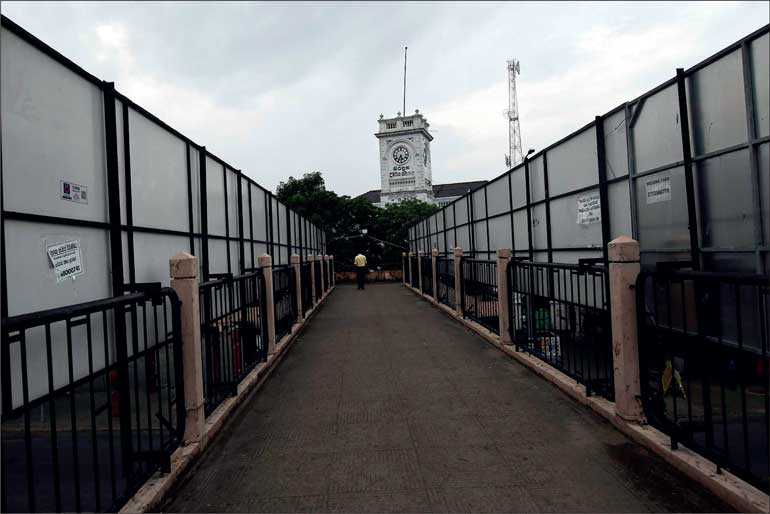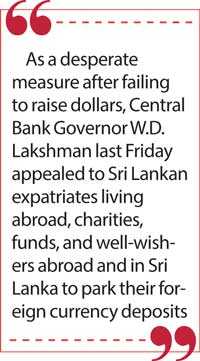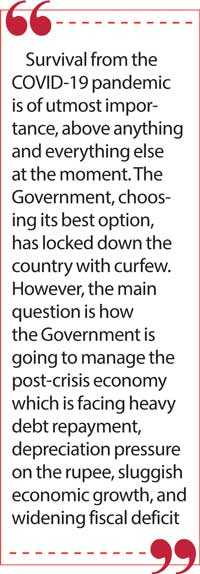Monday Feb 23, 2026
Monday Feb 23, 2026
Thursday, 9 April 2020 00:00 - - {{hitsCtrl.values.hits}}

Sri Lanka’s economy after the ongoing coronavirus pandemic will be a Pandora’s Box. Nobody can predict job losses, decline in exports, tourism, and remittances, and the depreciation of the rupee  currency. But the country is already witnessing all of these impacts and Sri Lanka’s post-COVID-19 economy is likely to have many trial-and-error policies.
currency. But the country is already witnessing all of these impacts and Sri Lanka’s post-COVID-19 economy is likely to have many trial-and-error policies.
Survival from the COVID-19 pandemic is of utmost importance, above anything and everything else at the moment. The Government, choosing its best option, has locked down the country with curfew. However, the main question is how the Government is going to manage the post-crisis economy which is facing heavy debt repayment, depreciation pressure on the rupee, sluggish economic growth, and widening fiscal deficit even before the pandemic started.
The coronavirus is not only going to hit Sri Lanka alone, but all other countries on different scales depending on their exposure to global financial, goods and services markets. For Sri Lanka, the main concerns will be if it can borrow externally at cheaper rates, how the country is going to face job losses for Sri Lankans locally and globally, and boosting economic activities. The external funding from Sri Lanka’s friendly nations will be limited this time as most of them are also facing economic doldrums.
Gradually, the country is witnessing the impacts of the novel disease which has globally killed over 80,000 people and infected over 1.3 million. The pandemic is still in an exponential phase and has not showed any signs of diminishing, especially in Europe and the United States, Sri Lanka’s main export destinations.
Most flights have been grounded globally. Sri Lanka’s tourism, which accounts for nearly 5% of the economy, has come to a zero level. It will be very hard for hotels and tourism-related businesses to  survive with no tourists. The industry survived last year even after the Easter suicide bomb attacks due to local tourists. But this year, it is going to be extremely difficult for the tourism industry globally.
survive with no tourists. The industry survived last year even after the Easter suicide bomb attacks due to local tourists. But this year, it is going to be extremely difficult for the tourism industry globally.
The Asian Development Bank (ADB) in its latest outlook said: “Clearly a recovery in tourism is delayed and restrictions on normal economic activity will entail financial pressures on many firms and individuals as experienced in countries having long-lasting lockdowns.”
The Central Bank and Treasury have proactively announced a wide range of financial and fiscal concessions to smoothen the tight finance for businesses and individuals. However, the benefits of these measures are yet to reach the grassroot level partially due to lockdown and mainly due to local banks and financial institutions which are yet to comply with the directives by the Central Bank despite warnings.
Inevitable job, salary cuts
Small and medium entrepreneurs and self-employed individuals will find no or very low demand for their goods and service while job cuts and salary reductions are likely to hurt most of private sector employees.
Already daily wage earners like three-wheel drivers and pavement vendors have started to grumble on sustaining their livelihood while large companies have gone for job and salary cuts. The State-run SriLankan Airlines last week announced salary reductions of 2.5%-25% for executive level employees and cancellation of payments and benefits for other employees including contracted pilots.
Sri Lanka’s biggest apparel exporter Brandix Lanka Ltd. last week announced a series of cost-cutting moves, including pay cuts as high as 60% for executive cadre to manage the impact from COVID-19 pandemic. The apparel industry has lost nearly $1.5 billion worth export orders for the second quarter of this year. Firing employees with or without compensation is being considered by many top-level conglomerates and companies. In the absence of export demand, State intervention to retain employees in private sector companies will only hurt business and investor sentiment.
The likely return of thousands of Sri Lankan expatriates in the face of overseas job cuts is going to add more oil to the burning fire. This will reduce foreign remittances, Sri Lanka’s top foreign exchange earner, significantly. Limited Government revenue is likely to force President Gotabaya Rajapaksa’s Government to not expand its public sector and not grant transfer payments for these job losers.
Grim growth prospects
It is going to be one of the toughest years for Sri Lanka’s economy, which in 2019 grew at 2.3%, its slowest pace since the contraction in 2001 after the LTTE attacked the Bandaranaike International Airport. The economy expanded at 3.3% in 2018. The Central Bank had predicted a growth of 2.8% last year.
In the face of a possible financial crisis with COVID-19 lockdown, the Central Bank has reduced its key policy rates by 25 basis points twice since 16 March to ease borrowing cost and minimise the COVID-19 impacts on businesses and personal finance.
The Central Bank has so far cut the rates by 100 basis points or 1% since 30 January. However, investors and entrepreneurs are unlikely to borrow in large sums unless they have the business confidence and the Central Bank’s rate cuts are unlikely to boost growth in the short term.
The Central Bank had predicted the 2020 economic growth between 3.5%-4% in early March before the pandemic hit the island nation hard. The ADB in its outlook said: “Ebbing global demand will stunt expansion in the tourism and garment industries, slowing growth to 2.2% in 2020 before expected recovery to 3.5% in 2021.”
Hard political manoeuvring
When Rajapaksa overhauled the tax policy soon after his election to give the public relief from  economic hardship, the authorities were working on a new personal income tax policy. However, a new tax would be impossible now because the public would not have enough money to pay.
economic hardship, the authorities were working on a new personal income tax policy. However, a new tax would be impossible now because the public would not have enough money to pay.
According to the ADB, the revenue to GDP ratio fell to 12.2% last year from 13.4% in 2018 as indirect tax collection in particular suffered from weak excise and VAT tax collection because of the large decline in imports and subdued economic activity after the terror attacks.
In terms of taxes and price stability, the ruling Sri Lanka Podujana Peramuna (SLPP) is also forced to keep the voters happy at least until the Parliamentary Election, which is now postponed without a date. Any new tax policies will have political implications at the elections. In addition to this, if the main Opposition’s stance of President Rajapaksa having no legal means to use public funds without Parliamentary approval after 31 April is true, that could complicate the economic crisis further, unless the President reconvenes Parliament.
When oil prices came down after Rajapaksa’s election, his Government firmly said it would not reduce the fuel prices for one year in line with the previous Government’s price formula. That helped the Government to have a cushion from the higher margin in the fuel prices. However, with much reduced economic activities now, the revenue from fuel is not going to be significant to compensate for the nearly Rs. 600 billion annual loss from tax reduction.
This means the Government will be forced look into external or local borrowing even at a higher cost due to downgrading of Sri Lanka’s outlook to Negative by two rating agencies and investors retreating to safe havens in times of crisis.
Difficult foreign borrowing
Borrowing from foreign sources to fill the gap between Government revenue and expenditure is one of the main strategies successive governments had been following to postpone economic crises. But that has always come at a price of widening the budget deficit, which is the main concern of multilateral lenders like the International Monetary Fund (IMF), World Bank, and Asian Development Bank (ADB). The country’s budget deficit is expected to have widened to 6.5% of the GDP from the targeted 4.4%. This year, it is going to expand further.
The Government had been externally borrowing to meet timely repayment of the past loans and for other development projects. Sri Lanka has to repay a record $ 5.89 billion foreign loans in currency, securities, and deposits in both principle and interest in the one year up to end January 2021, Central Bank data showed.
Sri Lanka has hardly seen any failure in its foreign currency borrowing efforts. Even at the peak of the 26-year war and recession due to 2008 financial crisis, the country was able to borrow, of course at a higher risk premium. Similarly, it has never defaulted any foreign loans and never failed to meet timely repayment. The Central Bank borrowed $ 4.4 billion last year through sovereign bonds at a relatively cheaper rate.
However, last week the Central Bank failed in its effort to raise US Dollars through Sri Lanka  Development Bonds (SLDB). The auction for this borrowing in US Dollars on 30 March saw only it meeting around 5% of its borrowing requirement of up to $ 200 million. The Government last month took a $ 500 million, 10-year loan from China Development Bank and the Central Bank had said it is in discussions to borrow a further $ 2 billion from China.
Development Bonds (SLDB). The auction for this borrowing in US Dollars on 30 March saw only it meeting around 5% of its borrowing requirement of up to $ 200 million. The Government last month took a $ 500 million, 10-year loan from China Development Bank and the Central Bank had said it is in discussions to borrow a further $ 2 billion from China.
Going forward, given global financial market conditions, it is going to be extremely difficult to borrow at the lower rate Sri Lanka had been used to. Sri Lanka’s largest foreign loan repayment for this year, which is the repayment of a maturing $ 1 billion sovereign bond, is scheduled for October.
Mindful of the heavy external debts, President Rajapaksa last week requested World Health Organisation (WHO) Director General Tedros Adhanom to pursue with the IMF, World Bank, ADB, and leading bilateral lending nations to provide debt moratoriums for vulnerable developing countries like Sri Lanka whose economies depend on COVID-19-hit tourism, exports, remittances and foreign investment in debt and equity markets.
Prime Minister Mahinda Rajapaksa also has sought a three-year debt moratorium from the Indian Government when he visited New Delhi early this year.
Desperate measures
As a desperate measure after failing to raise dollars, Central Bank Governor W.D. Lakshman last Friday appealed to Sri Lankan expatriates living abroad, charities, funds, and well-wishers abroad and in Sri Lanka to park their foreign currency deposits in local banks.
Lakshman in his official letter signed by both him and Treasury Secretary S.T. Attygalla stated Cabinet had decided to suspend restrictions on all foreign currency inflows during the COVID-19 prevention period – three months from 2 April.
The new Central Bank Governor’s move comes as the rupee has been hovering at record lows. The rupee’s Central Bank quoted local selling price per US Dollar hit a fresh record low of 193.75 on Friday and the currency has fallen nearly 5.7% so far this year, Central Bank data showed. With lower exports, remittances, and tourism revenue, the Central Bank Chief would have been compelled to go for this measure as the $ 87 billion economy hardly has any option at this juncture.
In his letter, Lakshman assured such deposits would be accepted without “any hindrance from the Government, Central Bank, or any other Government authority and assured foreign remittances would be exempted from exchange control regulations and taxes.
This desperate move also came after Sri Lanka’s stock and Government securities market suffered foreign outflows of Rs. 5.23 billion and Rs. 62.37 billion (nearly $ 365 million in total) this year up to 25 March, Bourse and Central Bank data showed.
“Your foreign currency deposits in the Sri Lankan banking system at this difficult stage will be of immense help to authorities to tide over the present crisis. Such remittances would go a long way to promote people’s welfare during the current period of still spreading COVID-19 and economic revival in the immediate aftermath,” Lakshman stated in the letter.
This was a tested and failed measure under former Prime Minister Ranil Wickremesinghe’s Government. When the rupee was facing heavy depreciation pressure in January 2016, then Finance Minister Ravi Karunanayake finalised a deal with an unnamed Belgian investor to park $ 1 billion in Sri Lanka. However, the then Opposition led by current Prime Minister Mahinda Rajapaksa, said Karunanayake was trying to launder black money. The deal never went through after Opposition criticism.
(The writer is former Reuters Economic Reporter for Sri Lanka. He can be reached at [email protected].)